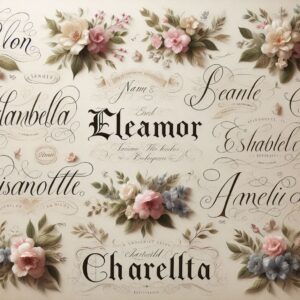In the vast tapestry of names, some threads are woven with a particular strength, carrying an undeniable gravitas and a timeless appeal. Eleanor is undoubtedly one such thread. Evoking images of queens, powerful figures, and an innate sense of grace, the name Eleanor has traversed centuries, maintaining its popularity and charm. It’s a name that feels both historically grounded and refreshingly contemporary, adaptable to various personalities and life paths. This comprehensive article aims to dissect the multifaceted nature ofnames like Eleanor, exploring its rich history, its prominent associations, and its enduring presence in modern nomenclature. Whether you are contemplating this name for a new addition to your family, researching its historical significance, or simply fascinated by its inherent beauty, this exploration will provide a detailed and insightful understanding of what makes Eleanor such a captivating choice.

Names Like Eleanor
2. What is Eleanor? Deconstructing a Timeless Name
The name Eleanor is far more than a mere collection of letters; it is a repository of history, meaning, and cultural resonance. To truly appreciate its depth, we must delve into its etymological origins, trace its historical trajectory, and understand its ongoing cultural significance.
Etymological Roots and Meanings
The precise origin of Eleanor is a subject of scholarly debate, but it is widely believed to be derived from the Old Provençal name “Aliénor.” This name itself is thought to be a Germanic compound name, potentially stemming from elements like “ali” (meaning “other” or “foreign”) and “nord” (meaning “north”). Another theory suggests a connection to the Greek name “Helen,” meaning “bright,” “shining one,” or “torch.” The most commonly accepted etymology, however, links it to “Aliénor,” which was famously borne by Eleanor of Aquitaine. The “Ael-” or “El-” prefix often associated with “Eleanor” may also point to an earlier Germanic root. Regardless of its exact linguistic genesis, the name quickly acquired an association with nobility and distinction through its early bearers.
Historical Trajectory: From Queens to Modernity
The journey of Eleanor through history is largely a story of powerful women. Its rise to prominence is irrevocably linked to Eleanor of Aquitaine (1122-1204), one of the most influential figures of the Middle Ages. She was Queen consort of France and later Queen consort of England, a woman of extraordinary intelligence, political acumen, and cultural influence. Her patronage of troubadours and her role in the development of courtly love made her a legendary figure. Through her, the name Eleanor became synonymous with royalty, power, and refined culture.
Following Eleanor of Aquitaine, numerous other noblewomen across Europe bore the name, further solidifying its regal associations. It appeared in various forms and spellings in different languages, such as Alienor, Leonora, and Elinor. The name experienced periodic fluctuations in popularity but never truly faded from use, resurging during periods of historical revival and appreciation for classic names. In the 19th and 20th centuries, it regained significant traction, particularly in English-speaking countries, perhaps due to a renewed interest in Victorian and Edwardian era names, as well as the prominence of figures like Eleanor Roosevelt. Today, Eleanor remains a beloved choice, bridging the gap between historical grandeur and contemporary appeal.
Cultural Significance and Popularity
Eleanor’s cultural significance is vast, extending beyond its aristocratic lineage. It has been featured in literature, music, and popular culture, often embodying characters of strength, wisdom, and elegance. Its consistent presence on lists of popular baby names globally speaks to its enduring charm. The name carries an inherent dignity and sophistication, often perceived as intelligent, graceful, and classic. Its widespread recognition ensures that it is familiar and well-received, yet it retains a distinct character that prevents it from feeling overly common or trendy. The name’s versatility allows it to suit a wide range of personalities, from the quietly contemplative to the boldly dynamic.
3. Was Eleanor Roosevelt a Good Person? A Nuanced Historical Perspective
When the name Eleanor is mentioned, for many, the first person who comes to mind is Eleanor Roosevelt (1884-1962). Her impact on American and global society was profound, making her a towering figure of the 20th century. Assessing whether she was a “good person” requires a nuanced understanding of her life, her actions, and the historical context in which she operated.
Early Life and Influences
Born Anna Eleanor Roosevelt, she was the niece of President Theodore Roosevelt and a distant cousin of her future husband, Franklin D. Roosevelt. Her childhood was marked by tragedy and a lack of parental affection, which instilled in her a deep sense of insecurity but also fostered a powerful drive for self-improvement and a profound empathy for others. Her education at Allenswood Academy in England under the tutelage of Marie Souvestre was particularly transformative, shaping her intellectual curiosity and independent spirit. These early experiences, though challenging, laid the groundwork for her later humanitarian endeavors.
First Lady and Activism
As First Lady from 1933 to 1945, Eleanor Roosevelt redefined the role. She was not content to be a passive hostess; she actively engaged in public life, holding press conferences, traveling extensively, and advocating for various social causes. She was a tireless champion for civil rights, women’s rights, and the rights of the underprivileged. Her vocal support for African Americans, often challenging racial segregation and discrimination, was particularly groundbreaking for her time. She famously resigned from the Daughters of the American Revolution when they refused to allow Marian Anderson, a Black contralto, to perform at Constitution Hall, subsequently arranging for Anderson to sing at the Lincoln Memorial, an iconic moment in civil rights history.
Humanitarian Efforts and Controversies
Beyond her advocacy in the United States, Eleanor Roosevelt played a crucial role on the international stage. After her husband’s death, President Truman appointed her as a delegate to the newly formed United Nations. There, she chaired the committee that drafted the Universal Declaration of Human Rights, a monumental achievement that set a global standard for human dignity. Her unwavering commitment to human rights earned her the title “First Lady of the World.”
However, like any significant historical figure, her life and actions were not without complexities and some degree of controversy. Her personal life, including her husband’s affairs and her own close relationships, were subjects of public scrutiny. Politically, her progressive views sometimes clashed with conservative elements. Yet, even her critics rarely questioned her sincerity or her deep commitment to public service.
Legacy and Impact
Eleanor Roosevelt’s legacy is overwhelmingly positive. She is remembered as a courageous, compassionate, and intellectually formidable woman who used her platform to fight for justice and equality. Her impact on civil rights, her role in the United Nations, and her transformation of the First Lady’s role solidified her as one of the most respected and influential women in American history. Her life stands as a testament to the idea that true “goodness” is often measured not by perfection, but by a relentless pursuit of a more just and equitable world, coupled with an unwavering commitment to one’s convictions. In essence, she was an extraordinary person who, through her actions, undeniably made the world a better place.
4. Names That Look Like Eleanor: Visual and Phonetic Kinship
The name Eleanor possesses a distinct visual and phonetic rhythm that makes it recognizable. For those who appreciate its aesthetic but seek a slightly different option, exploring names that share visual characteristics or phonetic similarities can be a rewarding exercise.
Names with Similar Letter Combinations
Certain names share letter sequences or structural patterns with Eleanor, creating a visual kinship. These often involve similar starting letters, vowel combinations, or consonant arrangements.
- Eleonora: This is a direct variant, often used in European languages, and visually very close to Eleanor, simply adding an ‘a’ at the end.
- Elinor: A classic and slightly more streamlined spelling of Eleanor, retaining almost all of its visual components.
- Evelyn: While phonetically different, the “Ev-” opening and the ‘l-n’ consonant pairing can give it a visual similarity to Eleanor.
- Leonora/Lenore: These names directly extract the “Leonor” or “Lenor” sound from Eleanor, making them visually and phonetically related.
- Eleanor (various spellings): As we’ll discuss later, the different spellings of Eleanor itself inherently “look like” Eleanor.
Names with Similar Phonetic Structures
Beyond visual appearance, some names share a similar sound profile or syllable structure to Eleanor, even if their spellings differ significantly. The soft “El” opening, the rhythmic three-syllable flow (in many pronunciations), and the gentle ending contribute to this similarity.
- Isadora: The three-syllable structure and the emphasis on the “a” sound in the second syllable can create a phonetic resonance.
- Genevieve: Similar in length and classic feel, with a gentle, flowing sound.
- Beatrice: Shares a similar dignified, classic feel and a three-syllable rhythm.
- Dorothea: Another elegant, multi-syllabic name with a historical feel.
- Florence: Though shorter, it shares a classic elegance and a somewhat similar sound profile with its soft consonants and clear vowels.
Exploring Variations Across Cultures
The name Eleanor, in its various forms, has been adopted and adapted across numerous cultures, leading to a beautiful array of similar-looking names. These variations often reflect the phonological rules of the respective languages.
These names provide alternatives that echo the charm of Eleanor while offering distinct identities, appealing to those who appreciate subtle variations on a beloved classic.
5. Beautiful Middle Names for Eleanor: Enhancing Elegance
Choosing a middle name for Eleanor is an opportunity to amplify its inherent elegance, add a personal touch, or create a harmonious flow. The key is to select a name that complements Eleanor’s classic and dignified nature without overpowering it.
Classic and Timeless Choices
Pairing Eleanor with another classic name creates a timeless and sophisticated combination that will never go out of style.
- Eleanor Rose: A truly exquisite and enduring combination. Rose is simple, classic, and adds a delicate touch.
- Eleanor Grace: Grace signifies elegance and beauty, perfectly complementing Eleanor.
- Eleanor Claire: Claire is bright and clear, providing a crisp, sophisticated feel.
- Eleanor Anne: Simple, traditional, and graceful.
- Eleanor Jane: A quintessential classic pairing, timeless and elegant.
- Eleanor Louise: Adds a touch of vintage charm and a soft sound.
- Eleanor Catherine: A strong, historical, and regal pairing.
- Eleanor Elizabeth: Two powerful, classic names that create a majestic combination.
- Eleanor Victoria: Evokes images of strength and victory, a grand pairing.
- Eleanor Margaret: A solid, traditional choice that feels both distinguished and warm.
Nature-Inspired and Whimsical Options
For those who wish to infuse a touch of natural beauty or whimsical charm, there are many lovely options that pair well with Eleanor.
- Eleanor Willow: Willow is soft, graceful, and evocative of nature.
- Eleanor Wren: A delicate, charming bird name that adds a unique touch.
- Eleanor Ivy: Classic and evergreen, Ivy adds a subtle nature connection.
- Eleanor Lily: A timeless floral name that enhances Eleanor’s elegance.
- Eleanor Pearl: Evokes rarity and beauty, a truly luminous choice.
- Eleanor Hazel: A warm, earthy, and gentle choice.
- Eleanor Skye: Modern and ethereal, adding a touch of lightness.
- Eleanor June: A charming, classic month name that feels sweet and gentle.
- Eleanor Fern: Simple, fresh, and grounded.
- Eleanor Aurora: A beautiful, flowing name meaning “dawn,” adding a touch of romance.
Virtue and Meaningful Selections
Middle names that convey a specific virtue or meaning can add depth and significance to the name Eleanor.
- Eleanor Faith: A strong and meaningful virtue name.
- Eleanor Hope: Conveys optimism and positivity.
- Eleanor Joy: A bright and cheerful addition.
- Eleanor Verity: Meaning “truth,” a sophisticated and uncommon choice.
- Eleanor Prudence: Implies wisdom and good judgment.
- Eleanor Felicity: Meaning “happiness” or “good fortune,” a lovely, flowing option.
- Eleanor Seraphina: Meaning “fiery ones” or “angels,” adds a touch of celestial beauty.
- Eleanor Gwendolyn: Meaning “white circle” or “fair bow,” a melodic and distinguished choice.
- Eleanor Amara: Meaning “eternal” or “immortal” in some cultures, adds a rich global feel.
- Eleanor Celeste: Meaning “heavenly,” a beautiful and ethereal choice.
When choosing, consider the flow of the full name, the number of syllables, and any personal significance the middle name might hold.
6. Cute Middle Names for Eleanor: A Touch of Sweetness
While Eleanor possesses inherent elegance, pairing it with a cute or sweet middle name can soften its formality and add a youthful charm. These names often tend to be shorter, with playful sounds or endearing connotations.
Short and Playful Picks
Shorter middle names can create a pleasant rhythm with Eleanor, offering a light and charming feel.
- Eleanor Bea: Short, sweet, and incredibly charming.
- Eleanor Dot: Vintage and endearing, a lovely nod to a classic.
- Eleanor May/Mae: Timeless, sweet, and evokes springtime.
- Eleanor Nell: A diminutive of Eleanor itself, making for a sweet and personal connection.
- Eleanor Pip: Playful and unique, a fun, quirky choice.
- Eleanor Rue: Simple, earthy, and uncommon, with a gentle sound.
- Eleanor Plum: Whimsical and unexpected, with a touch of sweetness.
- Eleanor Sky: Modern, light, and airy.
- Eleanor Tess: Classic, short, and sweet, giving a friendly feel.
- Eleanor Kit: Energetic and spritely, a charming unisex option.
Unique and Charming Pairings
These options offer a distinct and endearing quality, adding a touch of personality to the classic Eleanor.
- Eleanor Posy: A delightful, old-fashioned floral name that feels utterly charming.
- Eleanor Clover: Sweet and lucky, a unique nature-inspired choice.
- Eleanor Dixie: Southern charm and a sweet, lilting sound.
- Eleanor Lulu: Playful, lively, and undeniably cute.
- Eleanor Birdie: Whimsical and endearing, a nod to nature.
- Eleanor Fawn: Delicate and graceful, evoking imagery of the natural world.
- Eleanor Scout: Adventurous and spunky, a charming modern choice.
- Eleanor Coco: Chic and playful, with a touch of sophistication.
- Eleanor Sunny: Bright, cheerful, and full of warmth.
- Eleanor Gigi: A stylish and cute nickname-turned-middle name.
Modern and Trending Additions
For those who want to blend classic with contemporary, these modern choices add a fresh and cute dynamic to Eleanor.
- Eleanor Quinn: Stylish, strong, and concise.
- Eleanor Blake: Gender-neutral and modern, adding a cool edge.
- Eleanor Sage: Trendy and wise, with a natural feel.
- Eleanor Everly: Flowing and melodic, a popular modern choice.
- Eleanor Riley: Energetic and friendly, a popular contemporary option.
- Eleanor Sloane: Chic, sophisticated, and sleek.
- Eleanor Emery: Modern and soft, with a gentle strength.
- Eleanor Arden: Nature-inspired and literary, with a sophisticated charm.
- Eleanor Reese: Short, sweet, and very versatile.
- Eleanor Blair: Elegant, concise, and subtly modern.
The choice of a “cute” middle name can be a wonderful way to reflect a child’s playful spirit and create a name that grows with them, offering both timeless elegance and youthful charm.
7. Names That Go With Eleanor: Siblings and Thematic Pairings
When considering names that “go with” Eleanor, one often thinks about sibling names or names that share a similar aesthetic or historical lineage. The goal is to find names that harmonize with Eleanor without clashing or sounding too disparate.
Complementary Styles for Siblings
Eleanor pairs beautifully with other classic, strong, and traditionally elegant names.
For Girls:
- Beatrice: Shares Eleanor’s historical depth and regal feel.
- Charlotte: Another timeless royal name with a graceful appeal.
- Genevieve: Elegant, sophisticated, and slightly romantic.
- Josephine: Classic, strong, and full of vintage charm.
- Margaret: A strong, traditional name with many delightful nicknames.
- Rosemary: A beautiful, classic nature-inspired name.
- Victoria: Grand, historical, and unmistakably regal.
- Cecilia: Melodious, traditional, and universally appealing.
- Florence: Classic, artistic, and sophisticated.
- Penelope: Whimsical, literary, and enduringly popular.
For Boys:
- Arthur: A classic, kingly name that complements Eleanor’s regal association.
- Frederick: Strong, traditional, and carries a sense of enduring elegance.
- Henry: A timeless royal name, simple yet distinguished.
- Theodore: Classic, warm, and full of character.
- William: A perennially popular, strong, and historical name.
- August: Sophisticated, strong, and slightly old-world charming.
- Julian: Elegant, classic, and universally appealing.
- Charles: A traditional royal name, solid and refined.
- Edward: Classic, dignified, and historical.
- Sebastian: Sophisticated, classic, and a touch romantic.
Historical and Literary Connections
For those who appreciate the historical richness of Eleanor, pairing it with names that share similar backgrounds or literary associations can create a cohesive and meaningful theme.
- Girls: Matilda, Adelaide, Philippa, Guinevere, Isolde, Rosalind, Cordelia, Ophelia. These names evoke medieval or Shakespearean eras, much like Eleanor.
- Boys: Alistair, Benedict, Edmund, Laurence, Peregrine, Theron, Winston. Names with historical weight and a distinguished aura.
Modern and Harmonious Sets
Eleanor is versatile enough to work with more modern yet still elegant names, creating a fresh yet grounded feel.
- Girls: Stella, Ruby, Hazel, Clara, Audrey, Isla, Luna, Poppy, Cora. These names are popular but retain a classic quality.
- Boys: Miles, Owen, Finn, Leo, Noah, Asher, Milo, Jasper, Rowan. These names are currently popular but have a timeless feel and sound great with Eleanor.
The key is to consider the overall “feel” and flow of the names together, ensuring they create a harmonious and aesthetically pleasing sibling set.
8. Similar Names to Eleanor: Exploring the Family Tree
Beyond direct variants, there are many names that share a similar essence, sound, or origin to Eleanor, forming a broader “family” of related names. These can be excellent alternatives for those who love Eleanor but seek something slightly different.
Direct Variants and Derivatives
These are names that are directly derived from or are common variations of Eleanor in different languages or historical periods.
- Eleonora: (Italian, Spanish, German) – A beautiful, more overtly romantic version.
- Elinor: (English) – A classic, simpler spelling, equally elegant.
- Lenore/Leonora: (English, Spanish, Italian) – Shorter forms that retain the core sound and feel.
- Éléonore: (French) – The French spelling, adding a touch of Gallic charm.
- Nora: (Irish, English) – Often used as a diminutive of Eleanor, now a strong standalone name.
- Nell/Nellie: (English) – Traditional diminutives that can also stand on their own.
Names with Shared Etymological Roots
While complex, some names might share distant linguistic origins or influences, particularly from Germanic or Greek sources, giving them a subtle connection.
- Helen/Helena: (Greek) – If the theory linking Eleanor to Helen (meaning “bright, shining”) holds, these are direct relatives.
- Alienor: (Old Provençal) – The historical precursor to Eleanor.
Names with Similar Meanings or Connotations
Names that evoke similar feelings of nobility, light, or strength can be considered “similar” to Eleanor in spirit.
- Clara/Claire: (Latin) – Meaning “clear, bright,” echoing the potential “shining” aspect.
- Audrey: (Old English) – Meaning “noble strength,” a classic name with a similar dignified feel.
- Alice: (Old German) – Meaning “noble kind,” sharing a similar aristocratic charm.
- Matilda: (German) – Meaning “mighty in battle,” a strong, historical name.
- Regina: (Latin) – Meaning “queen,” a direct connection to royalty.
- Theodora: (Greek) – Meaning “gift of God,” a grand, classic, and regal-sounding name.
- Adelaide: (German) – Meaning “noble kind,” another classic name with historical depth.
- Catherine/Katherine: (Greek) – A perennially popular classic, often associated with royalty and saints.
- Genevieve: (Germanic/French) – Meaning “woman of the family/race,” a long-standing noble name.
- Victoria: (Latin) – Meaning “victory,” a name synonymous with queens and strength.
This broader view of “similar names” allows for more creative exploration while staying true to the appealing essence of Eleanor.
9. Different Ways to Spell Eleanor: Embracing Orthographic Diversity
While “Eleanor” is the most common and widely accepted spelling, the name’s long history and international presence have given rise to several variations. Understanding these different spellings can be useful for those who appreciate the name but desire a unique touch or an homage to specific cultural roots.
Common and Accepted Variations
These spellings are generally recognized and used, often reflecting regional preferences or slight linguistic adaptations.
- Eleanor: The most prevalent and standard spelling in English-speaking countries.
- Elinor: A classic, streamlined, and equally accepted variant, particularly popular in literature (e.g., Elinor Dashwood from Sense and Sensibility). It offers a slightly softer visual.
- Eleonora: Common in Italian, Spanish, German, and Eastern European countries. It adds a more romantic and flowing feel with the “ora” ending.
- Eleonore: Frequently used in French and German-speaking regions. The ‘e’ at the end is silent in French but pronounced in German.
- Leonor: A more concise version, popular in Spanish and Portuguese, often found in historical contexts.
- Lenore: A shorter, often more poetic variation, particularly associated with Edgar Allan Poe’s “The Raven.”
Less Common and Unique Spellings
These spellings are less frequently encountered but can offer a distinctive flair. They might be phonetic interpretations or creative adaptations.
- Elanor: A very rare simplification, potentially influenced by fantasy literature (e.g., Elanor Gamgee in Tolkien’s Lord of the Rings).
- Eleonor: Omitting the final ‘a’ from Eleonora, a slightly more concise European feel.
- Eleana/Eliana: While distinct names, they share a similar “El-” beginning and a flowing sound that might appeal to those who like Eleanor. (Note: Eliana has a different primary origin in Hebrew, meaning “My God has answered.”)
- Ellinore: A Scandinavian variant, retaining the ‘e’ but doubling the ‘l’ and adding an ‘i’.
- Alienor: The original Old Provençal form, very rare in modern usage but historically significant.
Considerations for Spelling Choices
When deciding on a spelling, several factors come into play:
- Pronunciation: Different spellings can subtly influence pronunciation. “Eleonora” sounds different from “Elinor.”
- Cultural Connection: A specific spelling might honor a family’s heritage (e.g., using Eleonore for a French family).
- Uniqueness vs. Familiarity: A less common spelling can feel more unique but might lead to frequent misspellings or mispronunciations. “Eleanor” is universally recognized.
- Flow with Middle and Last Names: Consider how the chosen spelling looks and sounds within the full name.
- Personal Preference: Ultimately, the best spelling is the one that resonates most with the parents and feels most right for the child.
While “Eleanor” remains the gold standard, the array of spellings available provides a rich spectrum of choices for those drawn to this timeless name.
10. Middle Names for Eleanor (Girl): A Curated List and Considerations
Choosing a middle name for Eleanor is a delightful task, as its classic nature makes it amenable to a wide range of complementary options. This section offers a curated list, categorized by style, along with key considerations for making the perfect choice.
Top Picks by Style
Here’s a comprehensive list of middle names for Eleanor, broken down by various stylistic preferences:
Classic & Timeless:
- Rose
- Grace
- Jane
- Anne
- Louise
- Claire
- Catherine
- Elizabeth
- Victoria
- Margaret
- Charlotte
- Beatrice
- Mary
- Alice
- Ruth
Nature-Inspired & Whimsical:
- Willow
- Lily
- Daisy
- Ivy
- Hazel
- Pearl
- Wren
- Fern
- June
- Aurora
- Skye
- Clover
- Bloom
- Faye
- Rain
Virtue & Meaningful:
- Faith
- Hope
- Joy
- Verity
- Prudence
- Felicity
- Amara (meaning “eternal” or “immortal”)
- Celeste (meaning “heavenly”)
- Seraphina (meaning “fiery ones” or “angels”)
- Sage (meaning “wise”)
- Anya (meaning “resurrection” or “boundless”)
- True
- Honor
- Belle (meaning “beautiful”)
- Aurelia (meaning “the golden one”)
Modern & Unique:
- Quinn
- Sloane
- Blair
- Rowan
- Sage
- Harper
- Scout
- Lux
- Everly
- Greer
- Maeve
- Tate
- Arden
- Ellis
- Piper
Sweet & Charming:
- Bea
- Mae
- Dot
- Nell
- Posy
- Lulu
- Coco
- Sunny
- Birdie
- Kit
- Rue
- Plum
- Gigi
- Lottie
- Molly
The Importance of Flow and Rhythm
The flow of the full name is crucial. Say Eleanor alongside the potential middle name and your last name aloud.
- Syllable Count: Consider the number of syllables in each name. A three-syllable first name like Eleanor (El-ea-nor) often pairs well with one-syllable or two-syllable middle names to create a balanced rhythm (e.g., Eleanor Rose, Eleanor Grace, Eleanor Marie). However, longer middle names can also work if they have a complementary sound (e.g., Eleanor Elizabeth).
- Sound Repetition: Be mindful of repeated sounds or syllables that might make the name clunky or hard to say. For instance, if your last name starts with an “R,” “Eleanor Rose” might have too many “R” sounds.
- Ending and Beginning Sounds: A middle name that starts with a consonant often flows well after Eleanor, which ends in an ‘r’ sound. However, a vowel-starting middle name can also work if the transition is smooth.
Personal Preference and Family Traditions
Ultimately, the choice of a middle name is deeply personal.
- Family Names: Many parents choose to use a family name as a middle name, honoring a beloved relative or family heritage.
- Meaningful Connections: The middle name can represent a value, a place, a season, or a person that holds special significance to the parents.
- Listen to Your Gut: Sometimes, a name just “feels right.” Don’t underestimate the power of intuition in naming.
By considering these factors and exploring the diverse options available, you can find the perfect middle name to enhance the timeless beauty of Eleanor.
11. Conclusion: The Lasting Legacy of Eleanor
The name Eleanor stands as a testament to enduring beauty, historical weight, and timeless appeal. From its regal origins to its contemporary popularity, it embodies strength, grace, and intelligence. Choosing Eleanor is to embrace a name rich in legacy, offering a sense of both classic sophistication and adaptable charm for any individual.
12. FAQs about the Name Eleanor
Q1: What is the origin and meaning of the name Eleanor? A1: Eleanor is largely believed to be derived from the Old Provençal name “Aliénor,” possibly meaning “other Aenor” or having roots in Germanic elements. Some theories also link it to the Greek name “Helen,” meaning “bright” or “shining one.” It has long been associated with nobility and distinction.
Q2: Is Eleanor a popular name today? A2: Yes, Eleanor remains a consistently popular name in many English-speaking countries and globally. It frequently appears in the top 100 baby names, reflecting its enduring appeal as a classic yet fresh choice.
Q3: What are some famous historical figures named Eleanor? A3: The most prominent historical figures include Eleanor of Aquitaine (Queen consort of France and England) and Eleanor Roosevelt (influential First Lady of the United States and human rights advocate).
Q4: Are there any common nicknames for Eleanor? A4: Yes, popular nicknames for Eleanor include Elle, Ellie, Nora, Nell, and Nellie. These offer softer, more informal alternatives to the full name.
Q5: What are some good middle names that go with Eleanor? A5: Eleanor pairs beautifully with classic middle names like Rose, Grace, Jane, Anne, and Claire. It also works well with nature-inspired names (Lily, Willow) and virtue names (Faith, Joy).
Q6: What is the male equivalent or a masculine name that pairs well with Eleanor? A6: While there isn’t a direct male equivalent, masculine names that share a similar classic, strong, and historical feel often pair well with Eleanor for siblings. Examples include Arthur, Henry, William, Theodore, and Frederick.
Q7: How many syllables does Eleanor have? A7: Eleanor typically has three syllables (El-ea-nor) in most English pronunciations.
Q8: Is Eleanor a religious name? A8: While not directly derived from religious texts, Eleanor has been borne by saints (e.g., Saint Eleanor of Provence) and has a classic, dignified feel that may appeal to those seeking a name with traditional connotations.
Q9: What is the difference between Eleanor and Elinor? A9: Eleanor and Elinor are simply different spellings of the same name. Eleanor is the more common spelling, while Elinor is a classic variant, often found in literature (e.g., Jane Austen’s Sense and Sensibility).
Q10: Can Eleanor be used for a boy? A10: No, Eleanor is almost exclusively a feminine name. There are no widely recognized historical or contemporary instances of it being used for boys.
13. Additional Resources
- Behind the Name – Eleanor: https://www.behindthename.com/name/eleanor
- Nameberry – Eleanor: https://nameberry.com/babyname/Eleanor
- Wikipedia – Eleanor of Aquitaine: https://en.wikipedia.org/wiki/Eleanor_of_Aquitaine
- Wikipedia – Eleanor Roosevelt: https://en.wikipedia.org/wiki/Eleanor_Roosevelt
- Social Security Administration (SSA) Popular Baby Names: https://www.ssa.gov/oact/babynames/ (for current popularity rankings)





